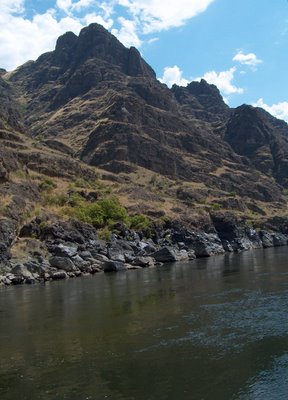I was born in Ohio, in Dayton, and grew up there, just 70 miles north of Cincinnati which, itself, sits on the Kentucky border. Half of the citizens of Dayton had moved there for economic opportunity over the decades from Kentucky. Sometimes, listening to the accents, I'd swear I lived in Kentucky too. I was told when I served in the Navy in Massachusetts that I also had a Southern accent. In the synapses of my brain I connected emotional prejudices to the concepts of "hill billies" and "Southern accents" which I struggle with to this day, sixty-eight years along in my life journey.
For a long time, when I thought of Dayton and the South, I felt like I feel when I watch the movie "Gummo" which is an accurate inner portrait of my feelings about my childhood in my own northern Southland. "Gummo" was made in Tennessee (with deep Tennessee accents) but was fictionally set in Xenia, Ohio which was a smaller country town, fifteen miles east north east of Dayton, where a tornado passed through back in the early 70s, killing many and cutting a half mile wide swath through Xenia's center.
When, eventually, I came west to the Pacific Northwest, I felt like I was escaping something, escaping the violence, ignorance and poverty as portrayed in that strange and disturbing movie. Some of my feelings were expressed in these three poems which I wrote less than two years after arriving in Cheney, Washington. Unlike many with "down home" pretensions and hopes, I wanted to escape what was eating me about my roots, but like most folks, my feelings were deeper, more ambivalent and confused, than my simple statements can reconcile. I think the poetry says it all better.
KENTUCKY HOME
I remember how it was—the snow and split rail fences,
The gray, low sky and pressing clouds, and I was on the ridge
Above the hollow where, through black bare hickories,
Bill and Pop came, making tracks through snow, fresh fallen,
Come in a night blizzard of wind that kept awake the house,
The hounds out ahead of them, finding scents
Of nothing I could recognize, circling and lunging
Through drifts, barking, a sound mixed in the hollow
With the sound of angry, human voices fractured by the bodies
Of hickories, distinct in the still, white glistening,
Arguing about something I was too young to understand—
They said—now let loose in the gray morning between them,
Till, finally, Pop gave out a yell for Birch, Bill's true
Birch, and that dog turned in his tracks, came back, called
From the scent, left the fallen oak he'd been sniffing at,
Came back, wagging his tail, thick with winter fur, dark
Against the fresh-fallen snow, when Pop lifted his Colt's
Steel-cold barrel to his hip high to fire from there,
And Birch dropped with a single yelp to bleed in snow,
And spring did not remove his body from that spot.

PAST SEATTLE
for Geoff P.
"Our settlement's only sign of life was smoke;
It drifted up in calms between the blizzards.
I recall it was the color of the sky.
There was never enough food so we ate tubers,
And what the snow did to us we never forgot;
It was the one sure fact we lived against.
The graves spread on a knoll to the east
Where the birch and the pine were thinnest,
And the path to the knoll stayed dark all winter.
In the spring, the grass there came back lush."
Generations later, I stand on the coast
And think west across water that whispers
In my dreams, and I remember that voice.
It rains way too much here, for days obscuring
everything with mist. I drink too much, get drunk,
Try to boogie myself out of the plain facts.
Too many days, I think of them
Who I never knew. Their graves in the snow
Stretch a long shadow, even to this time.
I stare too much out of barroom windows
While Greyhounds gun by from the passes,
Their snowed tops already running slush,
The smoke of their exhausts beaten down by rain.

RISING IN CHENEY
Where I came from, towers shove sense into the sky,
The eye is driven by sheer weight of stone up
To the transparent blue men live by. It takes
Elevators to lift them, in a soundless
Rattle of chains, to higher places.
Men get hauled around a lot like that,
In desperate clusters, and hold their breaths,
Driven dizzy by the artificial highs.
There's a mile of road from there to Cheney,
And the Rockies slope the glance a natural way up
From the commonness of grass along the way.
You're a long time on the other side
Before the land lets you in, and you know
How breathing's a natural way to live.
Cheney's a two-story town at most—
No one's got to strain beyond that climb,
Movement settles to an easy walk,
And the sun gifts everyplace with its own low shadow.
Effortlessly, by accidental glance,
You receive the sky's blue sense. Living
Becomes a matter of sitting tight, rising
Less than a deep breath exhaled.
No comments:
Post a Comment